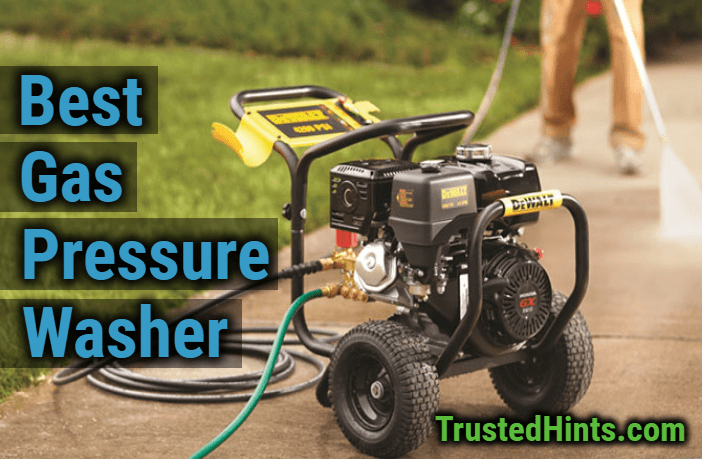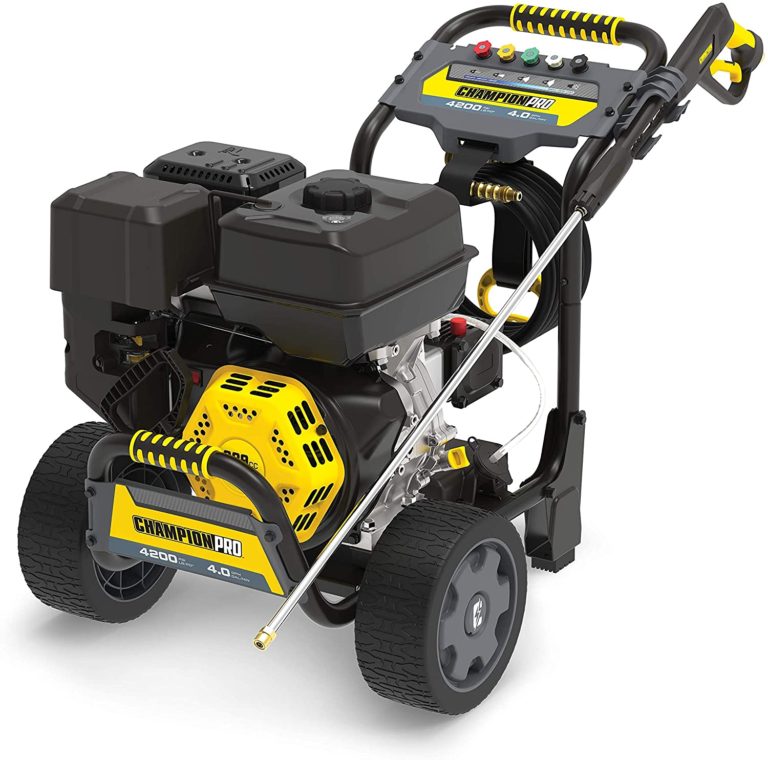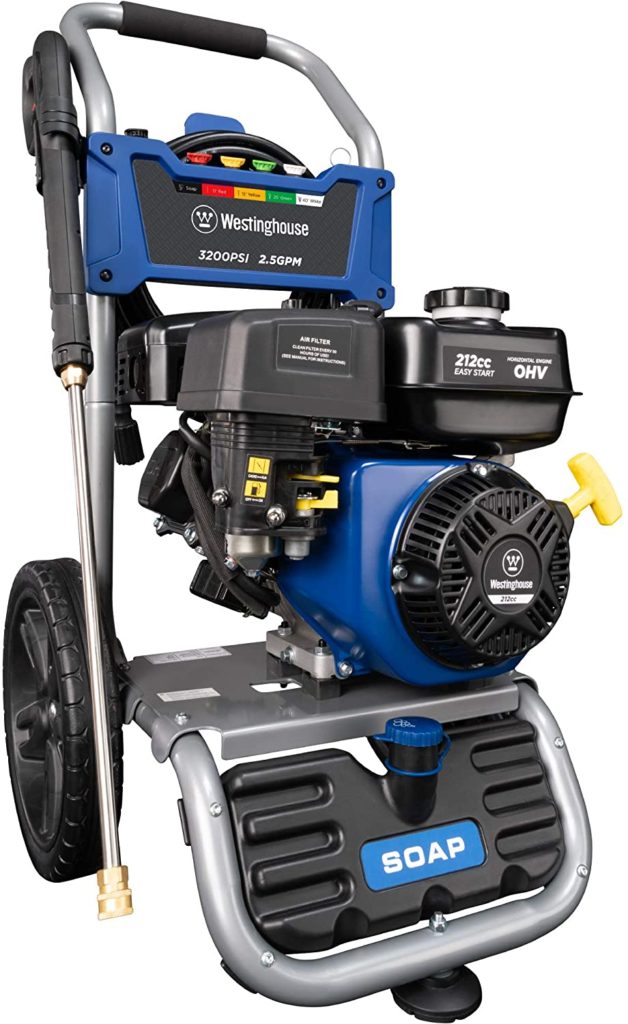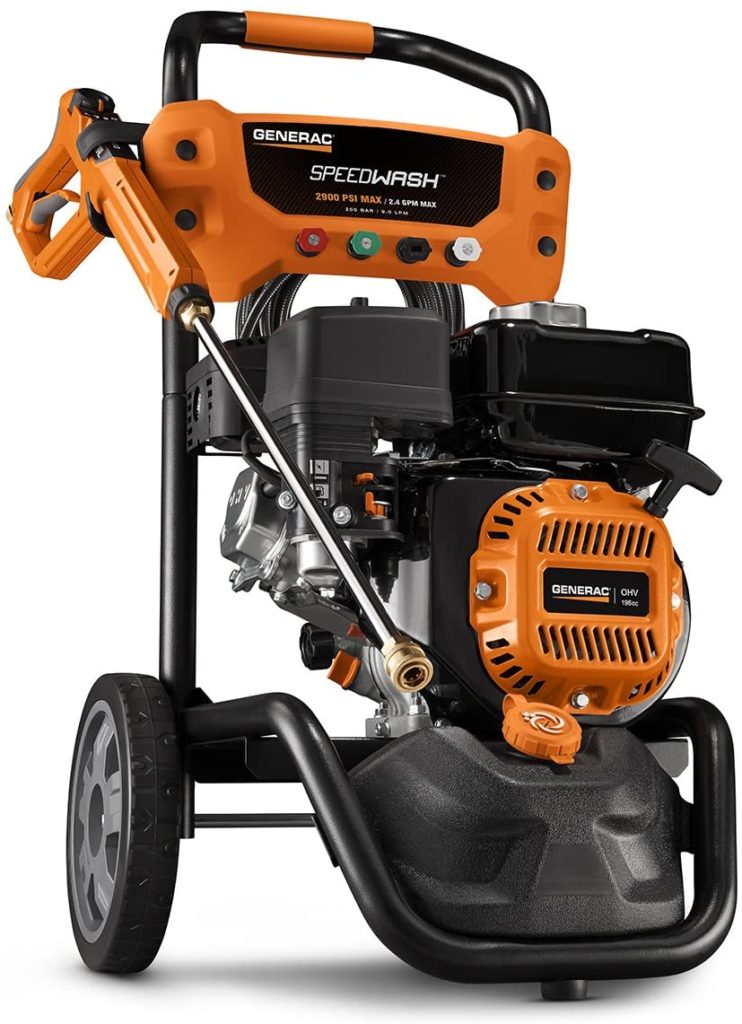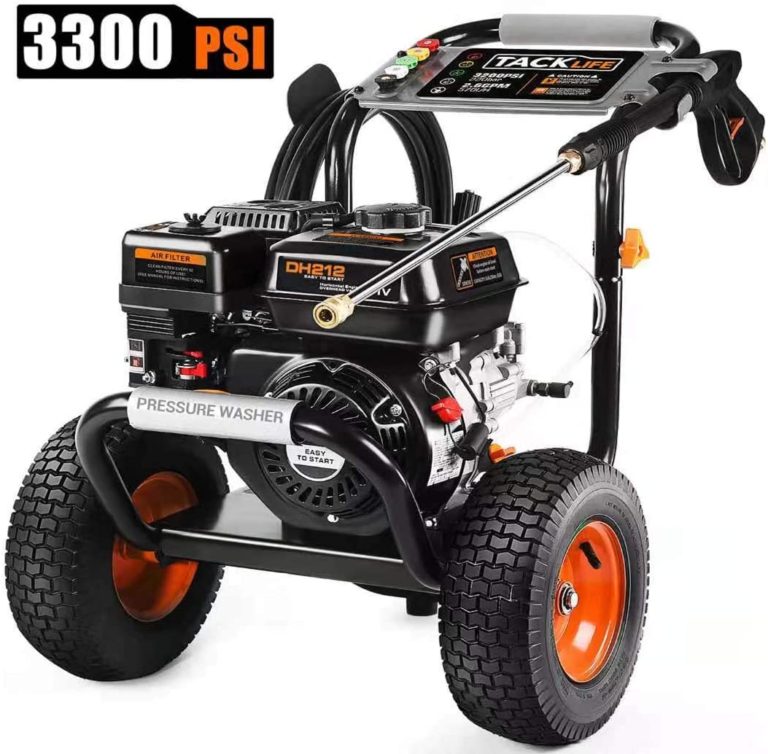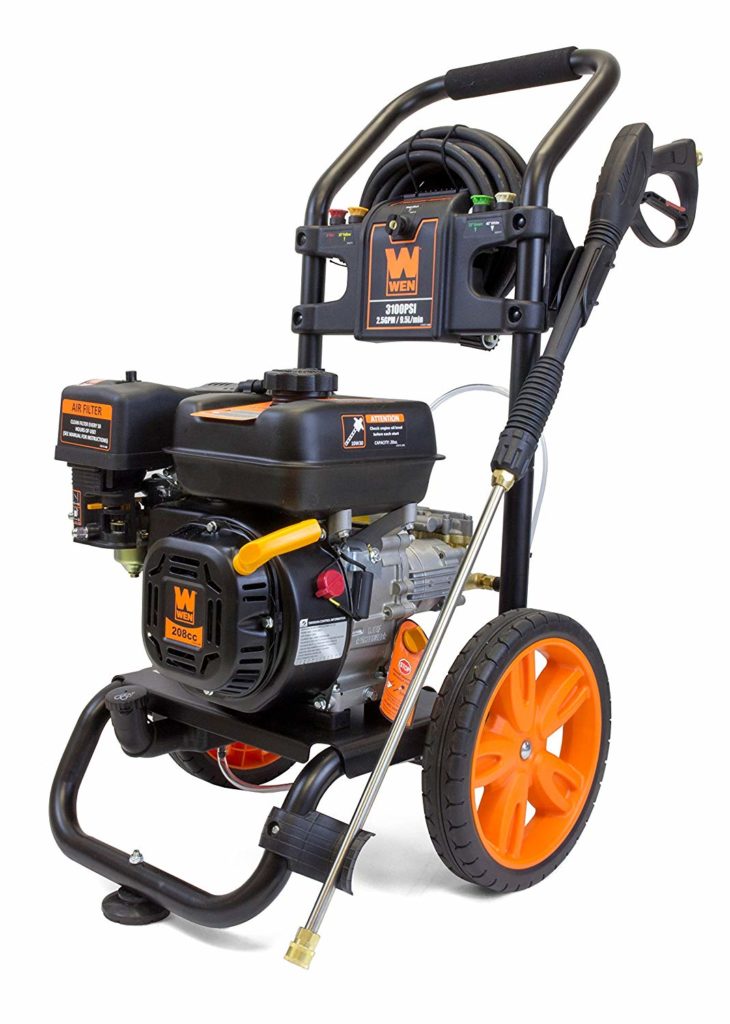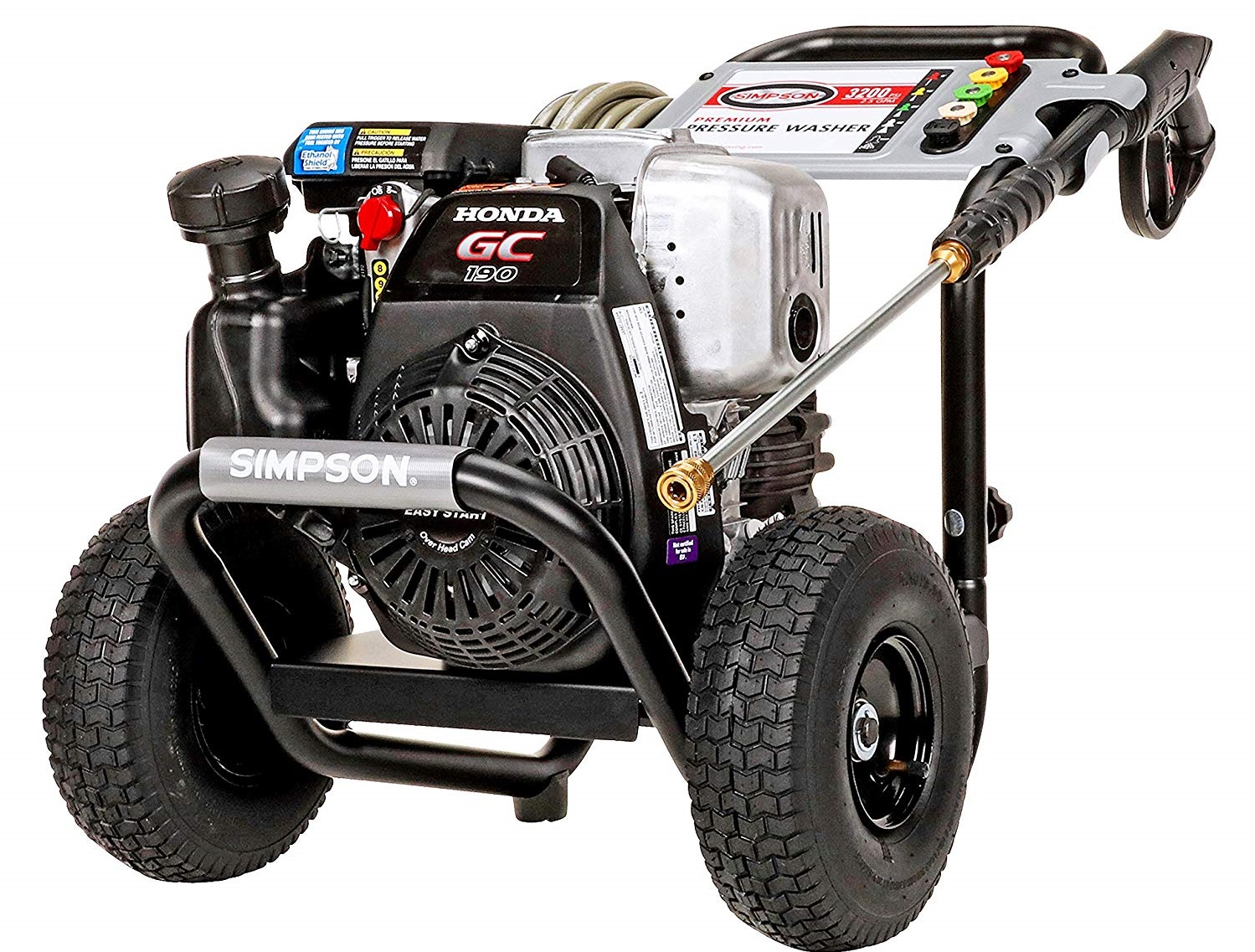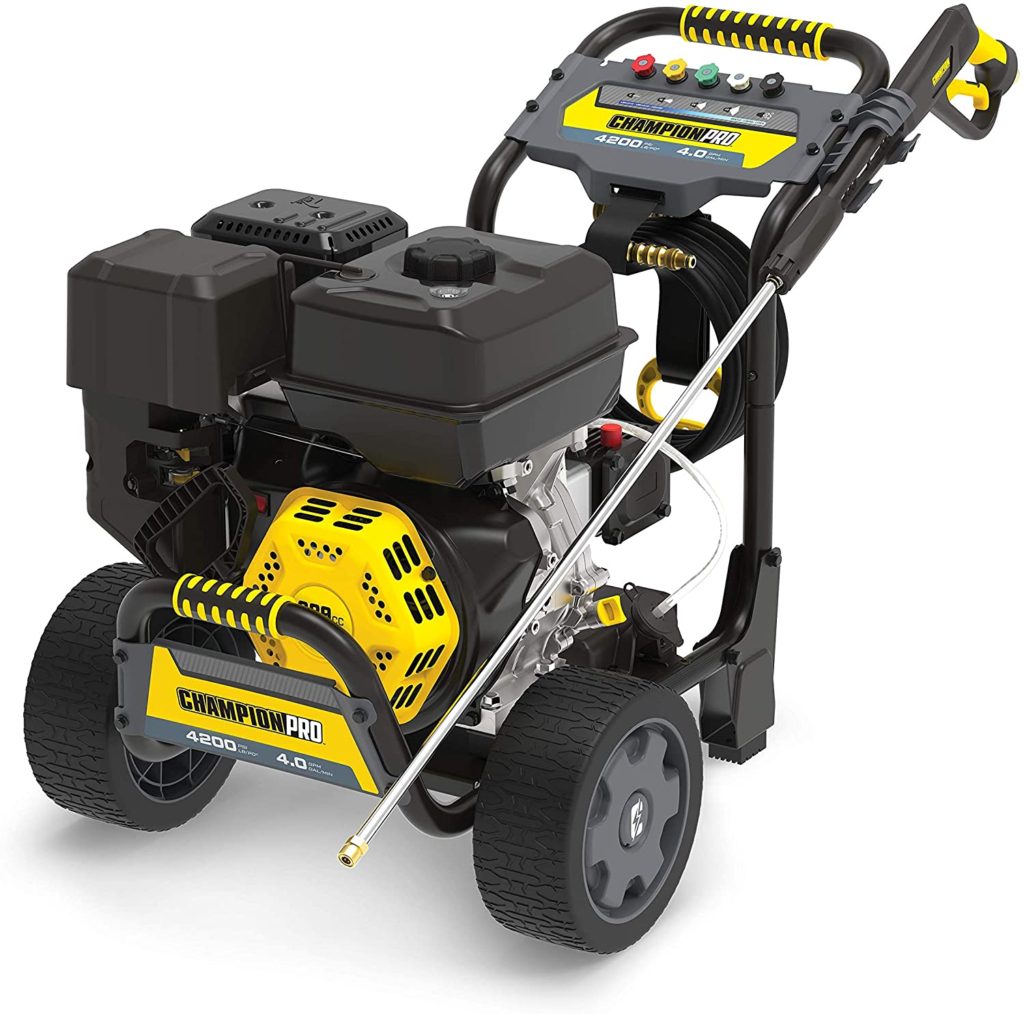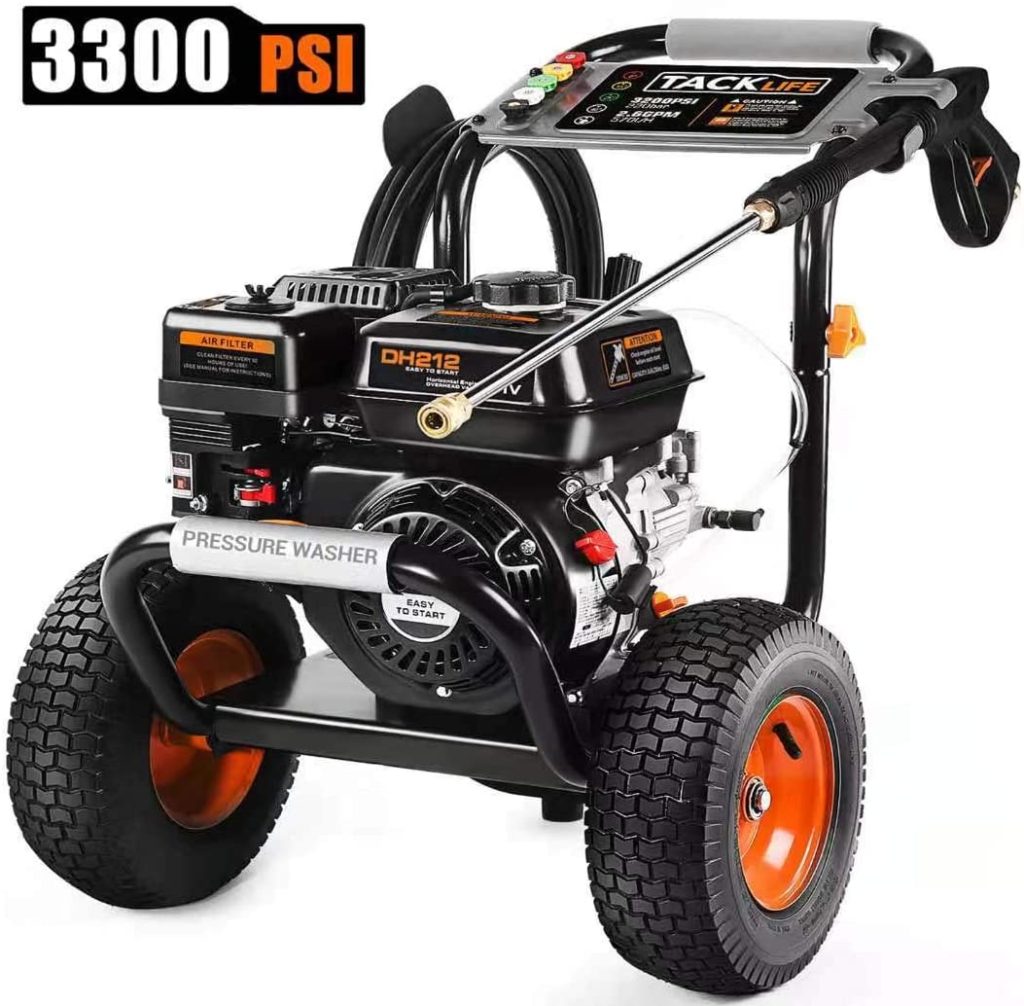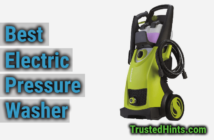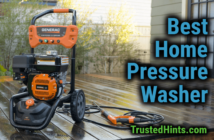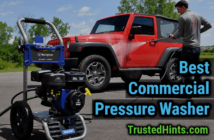When you need high-pressure output, electric pressure washers are not enough. That’s when the gas pressure washers come in. They come in different sizes, and the PSI rating ranges from 2500 to 5000 PSI to tackle any cleaning task.
We have tested many gas pressure washers according to their PSI/GPM ratings, hose length, fuel tank capacity, and much more. So you can compare them and make a better buying decision.
So here are reviews of the best gas pressure washers for 2022.
| Simpson MSH3125 (Best Overall)
  |
| Champion 100790 (Highest Power Output)
     |
| Westinghouse WPX3200 (Cheapest yet Quality Pressure Washer)
  |
| Generac 6882 GPW (Another Affordable Alternative)
     |
| TACKLIFE GSW01A
     |
| WEN PW3100 Gas Pressure Washer
     |
Best Gas Pressure Washer
1. Simpson MSH3125 MegaShot Gas Pressure Washer
Simpson MSH3125 is one of the highest-rated gas pressure washers on Amazon with many satisfying positive reviews.
You don’t have to deal with any more kinks because its 25-feet MorFlex hose features the kink & abrasion-resistant material. Included five stainless nozzles help you clean different surfaces effortlessly, making the cleaning process more fun.
With its 3200-PSI pressure output at a 2.5 GPM flow rate, you can make your driveway look brand new in under 1 hour. That’s not all; you can use it to clean home, RV, cars, outdoor furniture, and other things as well.
It weighs only about 65 pounds, and its 10-inch pneumatic tires make it easy to maneuver the machine, and also, one person can easily transport it.
The OEM axial pump combined with the Honda engine makes this pressure washer very reliable and dramatically improves cleaning performance.
Moreover, the welded steel-construction frame and base plate are the reason why it won’t break as easily as other plastic-made pressure washers. And on top of that, all the parts of this machine are non-corrosive and made from premium stainless steel.
The manufacturer offers a 2-year warranty on the engine, 1-year on the pump, 5-year on the frame, and 90-day on accessories.
2. Champion 100790 Commercial Duty Gas Pressure Washer
When you need a high-pressure output to tackle heavy cleaning jobs or want a pressure washer for commercial applications, there is no better option than Champion 100790 Commercial Duty Gas Pressure Washer.
This unit can put out 4 gallons of water per minute at 4200-PSI, and with this amount of cleaning power, you can complete any job in a matter of a few minutes.
This versatile machine boasts a commercial-grade Triplex brass-head pump, which is top of the line and offers seamless performance and not to mention the corrosion-free construction and longer life expectancy of the pump.
The pressure washer’s comfortable grip reduces fatigue; thus, the cleaning experience becomes much more enjoyable. And let’s not forget the onboard storage tank for the pressure hose, which is very convenient.
You will be surprised to know that it comes with a 50-foot hose so you can easily clean every part of the house without bringing the machine into your house because there is a risk of CO2 buildup.
In addition to the hose, this gas pressure washer also includes a separate detergent hose, and if we talk about the additional accessories, then you will get an oil funnel, 5 quick-connect nozzles, a spray wand, a trigger gun, a storage strap, detergent hose, and engine oil.
This machine is sold with a 2-year warranty and lifetime technical support that gives the user peace of mind.
3. Generac 6882 GPW 2900PSI Power Washer
Generac 6882 is another prominent gas-powered pressure washer in our list, which is relatively affordable. It has a pressure output of 2900-PSI with a 2.4 GPM flow rate to help you get the job done quickly.
I like this particular unit because instead of using nozzles to increase or decrease the pressure, you can manually adjust the pressure through the spray wand. Various nozzles are essential when it comes to cleaning different surfaces, such as wood and concrete.
The soap blaster attachment of the pressure washer sprays three times faster than a standard nozzle tip, improving the cleaning results exponentially.
Other than that, the 25-foot long hose is non-marring, kink-resistant, and very flexible, which is why it lasts quite long.
The machine’s upright style allows for a smaller storage footprint and the wheels help you move it around easily. This unit doesn’t support hot-water cleaning; however, you can easily clean the patio, driveway, card, and deck.
This unit comes with many variants that include different accessories and slight power output differences so you can choose any product according to your needs. Last but least, it is sold with a three-year warranty to make sure it lasts longer.
4. Westinghouse WPX3200 Gas Powered Pressure Washer
If you are looking for a budgetary gas pressure washer with decent features, then Westinghouse WPX3200 is for you, and it also happens to be the cheapest gas pressure washer on our list.
It can blast 2.5 gallons of water per minute at 3200 PSI, which is why this unit is a great choice for daily domestic use. It can be used for cleaning decks, sidewalks, siding, fences, railings, garage floors, exterior walls, and much more.
When it comes to accessories, this model comes with 5 quick-connect nozzles, a spray gun, engine oil, tools, and a quick guide to get started right off the bat.
The 12-inch high-profile wheels make transportation straightforward and effortless, whereas the steel frame construction gives the pressure washer extra durability.
This heavy-duty gas-powered pressure washer is fitted with a 4-stroke OHV engine and maintenance-free Axial Cam pump for optimal performance.
To double the cleaning power, Westinghouse WPX3200 features a 0.5-gallon onboard detergent tank, and the included nozzle tips are very convenient and useful. Despite its affordable price range, this CARB-compliant pressure washer offers excellent features and performance, and it comes with a 3-year warranty.
5. WEN PW3100 3100-PSI Gas Pressure Washer
WEN is another great brand known for its quality products, and this gas pressure washer is no exception. The machine’s powerful 208cc 4-stroke engine can easily pump out 2.5 gallons of water per minute and then pressurize it up to 3100-PSI.
There’s nothing this machine cannot clean. Just turn on this pressure washer and point it on the stains/tars, and voila, all the oil stains and dirt are gone.
The included hose is about 30-foot long so you can easily clean unreachable areas in your house. Furthermore, the onboard detergent tank provides extra-cleaning power for tough jobs, and it has a maximum capacity of 32 fl. Oz.
Although the internal engine is not as powerful or reliable as the Honda engine, it still gets the job done, and compared to its price range, I would say this is a pretty good deal.
The quick-change technology makes the changing process of nozzles hassle-free. Aside from the soap nozzle, you will get 0°, 15°, 25°, and 40° nozzles that are designed to get rid of all the mess with minimal effort and increased efficiency. WEN PW3100 gas pressure washer is backed by 2 years of warranty.
6. TACKLIFE GSW01A 3300PSI Gas Pressure Washer
Our next product is TACKLIFE GSW01A, and it is ideal for commercial applications as well as home use.
You will get 3300-PSI pressure output combined with a 2.6 GPM of water flow rate to help fight even stubborn stains, dirt, and debris. The manufacturer claims that this machine burns the fuel completely; hence you will get an efficient conversion of up to 95%.
The fuel tank has a capacity of 1 gallon, which eliminates the need to refuel the tank again and again. Additionally, the 30-foot long hose becomes very handy when you want to clean the areas located at a distant height.
There’s enough space on the machine to store a water pipe, five nozzles, and a spray gun. Although this unit is bulky and heavy, thanks to its two detachable anti-slip wheels, even a single person can easily move this 77-pound machine all by himself.
Moreover, these pneumatic wheels will give you great mobility and shock absorption when carrying it from one place to another.
This gas pressure washer is IPX5 rated, so you don’t have to worry about getting it wet when cleaning. This pressure washer utilizes the axial cam pump to give you steady nozzle pressure for a consistent cleaning process, and it has a longer life cycle than other pumps.
TACKLIFE promises a 24-month service for the engine and pump and a 12-month service for the frame and accessories for the user’s convenience.
Which is best; Gas or electric pressure washer?
First, let’s talk about electric pressure washers. As you know, the electric pressure washers run quietly and do not need any maintenance. And also, they do not produce any harmful gas emissions, so you can easily use them in your home without any risk of CO2 buildup.
On the other hand, its pressure output and flow rate are limited. Moreover, you cannot clean the area beyond the reach of the cord length.
Now the gas pressure washers offer a higher-pressure rating with an enormous flow rate. And their PSI rating ranges from 1500 to 5000 PSI, which is ideal for commercial applications as well as residential use.
Additionally, the gas pressure washer can last for many life cycles and can be used at remote locations as well.
Due to a lack of cords, you don’t have to deal with power outlets. Just sip in some gas and start cleaning. It also comes with never-flat tires that let you wheel the machine effortlessly.
On the downside, it requires frequent maintenance, produces so much noise, has gas emissions, and cannot be used indoors.
Despite many cons, gas pressure washers are very popular these days due to their unparalleled cleaning power and remarkable performance.
Commercial or Residential
Many electric pressures are marked as “commercial-duty,” but they don’t really provide the necessary pressure output and flow rate professionals need. Moreover, they cannot handle the load of daily use and may fail due to heating issues.
So here, we are going to discuss the commercial vs. residential gas pressure washers. What makes the commercial gas pressure washer superior is its engine and pump.
They are fitted with commercial-grade engines such as Honda GC series engines. Unlike the engines of home pressure washer, these engines have cast iron cylinder sleeve that is very durable and last longer.
Another important part of the commercial gas pressure washer is its pump. It uses a triplex pump that can easily handle high-pressure demand and high flow rates. Unlike the axial camp pump, the triplex pump runs at lower RPM resulting in a longer life span and less heat production due to less wear & tear.
So, in the end, it all comes down to your choice. If you are regularly using the pressure washer, we advise you to choose the commercial gas pressure washer. If you do occasional cleaning for a short amount of time, get the best home pressure washer.
Buyer’s guide for the best gas pressure washer
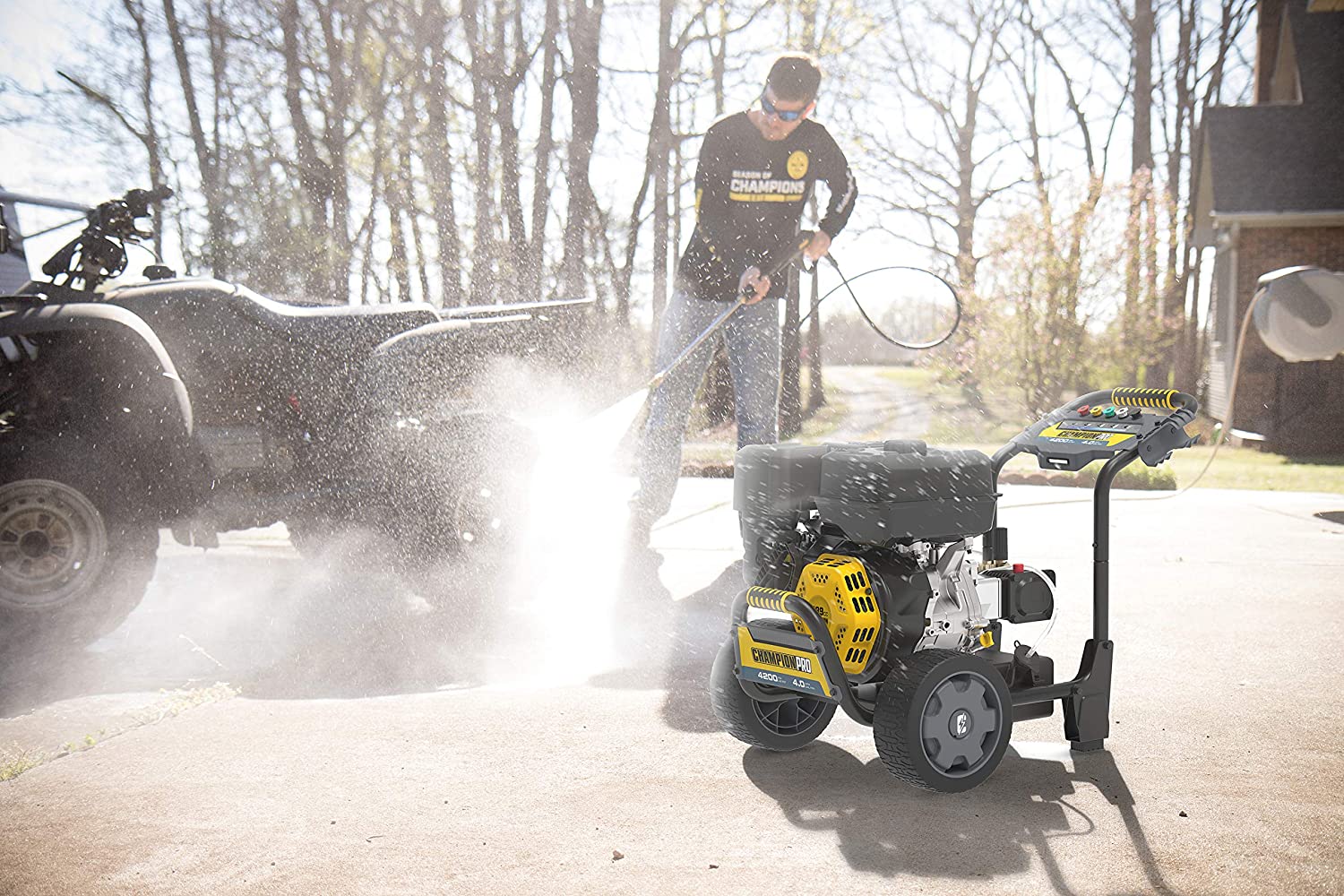

1. Cleaning Power
This is one of the most important factors when choosing any gas-pressure washer. The cleaning power is the multiplication of PSI (pound per square inch) and GPM (gallons per minute).
- PSI: It represents the force of the water created by the machine to blast away dirt and debris from the surface.
- GPM: It means the amount of pressurized water pressure the washer can process per minute. The higher GPM will help you clean quickly.
If you only want to use the pressure washer for light work, then choose the low cleaning power and if you are using the pressure washer daily for heavy cleaning, then get the higher cleaning power machine.
2. Onboard Detergent Tank
This tank holds the detergent water and dispenses it when needed. You need to use the soap applicator and soap nozzle to spray the detergent water before cleaning. Some high-end gas pressure washers come with a dedicated detergent hose for optimum results.
3. Wheels
Wheels make pressure washers portable and mobile. Although all the gas pressure washers come with dedicated wheels but they differ in terms of wheel diameter and type of material used. Some are fitted with pneumatic wheels, and some include no-flat tires for improved performance.
4. Onboard Storage
Most of pressure washers these days have on-board space to store the hose, spray nozzles, and wand, so all the things are within the hand’s reach so you don’t have to waste your time finding the accessories while cleaning.
5. Pressure Hose
Not all pressure hoses are the same; some are designed to be more flexible but cannot handle kinks; thus, they wear out quickly. On the other hand, some are designed to prevent kinking but maneuvering them is really hard.
Also, keep in mind that the length of the hose should be ideal because more length will cause a pressure drop and the short length will result in moving the pressure washer too often.
6. Accessories
Included accessories help you operate the machine effectively. Such accessories consist of engine oil, extension wands, detachable nozzles, angled wands, brooms, and certain cleaning chemicals.
Considerations
1. Maintenance
You don’t have any control over the pressure washer’s maintenance, and it depends on the model. It requires regular maintenance such as changing of oil, maintaining the fuel level, and changing the air filter, and spark plugs. To increase the service life of the machine, you have to take proper care of it. You can also refer to the user manual to know more about this.
2. Warranty
There is no telling when the pressure washer may stop working, but having a decent warranty will cover the repair cost. Anything above a 2-3 year warranty on the pump and engine is considered decent. Moreover, the manufacturer should support the after-sale service and not mention the lifetime customer support.
3. Ease of storage
Especially the gas pressure washers have a larger footprint; thus, they are difficult to store in confined spaces. However, some pressure washers come with foldable handles and a more portable design so you can easily store them in your house.
4. Cost
Cost is a major concern for most buyers. Keep in mind that as the features and cleaning power increases, the gas pressure washer’s cost also increases. Residential pressure washers are very affordable, but they have limited PSI and GPM output.
Helpful tips and tricks to operate the pressure washer easily
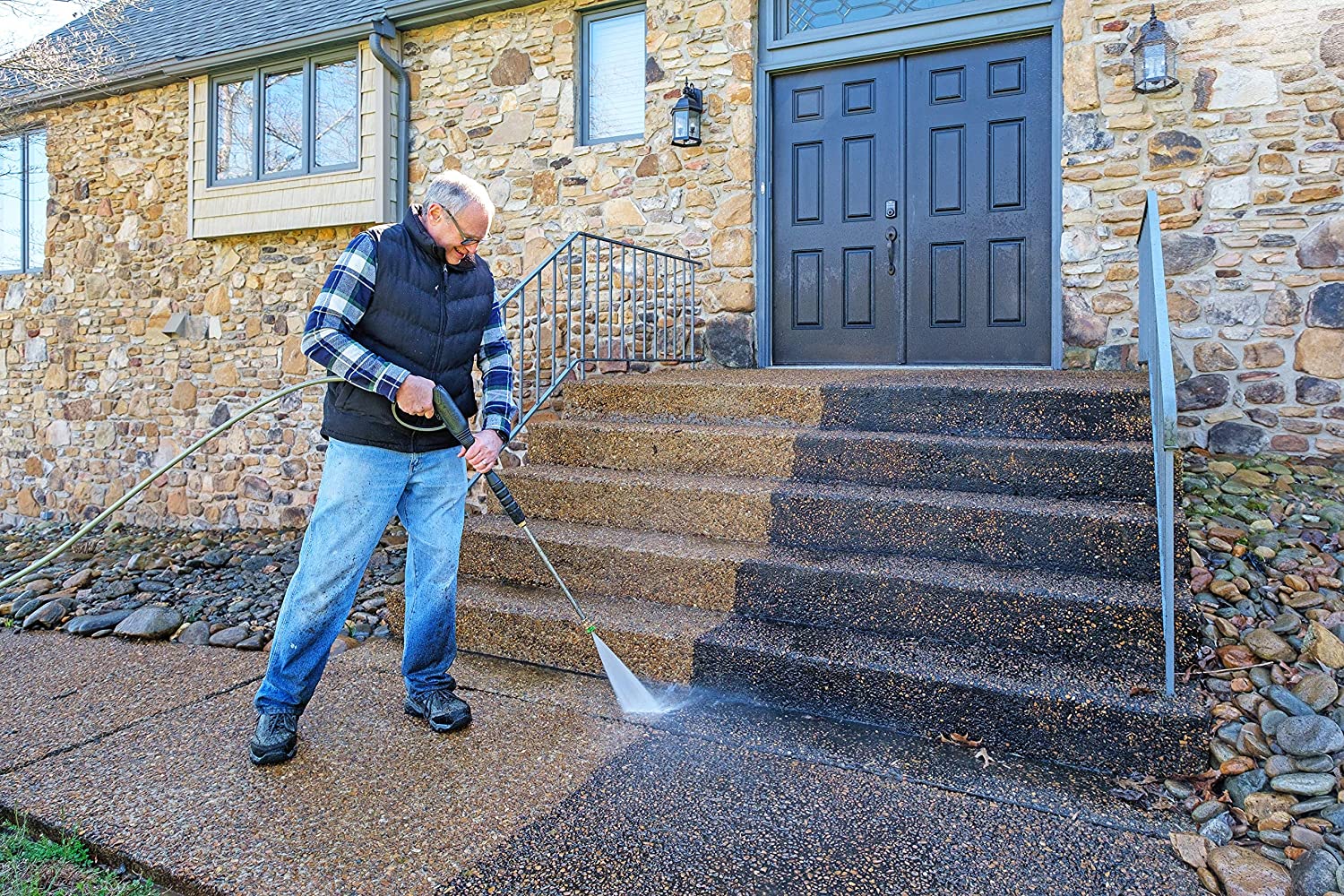

If you are purchasing your first gas pressure washer, then you may not know the troubleshooting process or some real-world tips that are actually helpful. So we have put together a list of noteworthy tips and tricks that every house owner should know.
1. Read the manual
Reading the manual may seem like a boring task but it’s for your own good. By reading it, you may know some important operating procedures or troubleshooting tips. So when you are free, just go through the manual to know more about your pressure washer.
2. Oil leaking during transit
Many buyers have experienced this problem, and it is very common. This occurs mainly due to poor packaging. This oil leaks through the engine and soaks into the air filter, which may choke the engine. So first try to dry the air filter and then start the engine if the problem still persists, then change the air filter.
3. Fitting and other loose connections
Some gas pressure washers come disassembled, so you need to fit the hose, spray gun, and other attachments by yourself. So before you start the machine, make sure all the water connections and bolts are perfectly tightened.
4. Prime the pump
The air trapped inside an empty hose can cause damage to the pump. So we advise you to run the water through the hose for a few minutes before you use the machine. The short hoses will be primed very quickly than the long hoses.
5. Post-op care
When you are done cleaning, don’t throw the machine directly into the garage, especially after longer cleaning jobs. Do some maintenance such as emptying the pump, adding the pump saver, and checking the condition of the hose. So this way, the life expectancy of the pump and engine increases.
6. Change the oil
Experts suggest that after every 15 to 21 hours of use, you should change the oil of the pump and engine. Basically, this oil helps in cooling down the internal temperature due to the rotation of parts and gears. Moreover, the new machines have loose metal shaving in the engine that accumulates in the oil, which is why you need to change the oil frequently.
7. Use the right oil
Don’t put any oil in the pressure washer. Because the oil you use in your car might not be a good choice for the pressure washer because they have smaller engines; thus, they use small air-cooled engine oil. Always use the oil recommended by the manufacturer or, as stated in the manual.
8. Don’t use the extension hose
Most gas pressure washers come with 25 to 30-foot long hoses, which increases to 45 to 50 feet in commercial gas pressure washers. However, using the extension hose with a pressure washer would be a terrible idea because the output pressure will decrease, as the water has to travel more distance. So just stick with the original hose provided with the package.
9. Be mindful of hoses when moving the pressure washer
You need to be very careful if the hose is too long and gets in the way when moving the pressure washer. Because any wrong step can damage the hose that is connected to the pressure washer, and also it can get tangled up, thus damaging the outer surface of the hose. So always keep it on the hose reel and use it when necessary.
FAQ
How do you winterize the gas pressure washer?
First, remove water from the pump, empty the detergent tank, and ensure that all the internal seals of the machines are protected. Then you need to add the fuel stabilizer into the gas tank and run the machine for 2 minutes so that the stabilized fuel can flow through the whole system, or you can opt-in for draining out all the fuel to prevent it from freezing.
How do you start a gas pressure washer?
Make sure that the main water supply is connected to the inlet of the pressure washer, and that the hose is properly connected to the machine. Attach the suitable nozzle according to your cleaning requirement.
After checking all the things properly, engage the chock and pull the cord, and in case the pressure washer has an electric switch, then switch the engine to the ON position. And after the machine starts, you can turn off the choke.
When using a smaller angled nozzle such 0-degree nozzle, be extra careful and make sure that you don’t hurt yourself.
How loud are different types of gas pressure washers?
It’s no secret that gas pressure washers are relatively louder compared to electric pressure washers. As the power output of the gas pressure washer increases, the noise production also increases. And the commercial gas pressure washers are the loudest of all. Also, note that the noise will keep on increasing as you throttle the machine to increase the PSI/GPM output.

